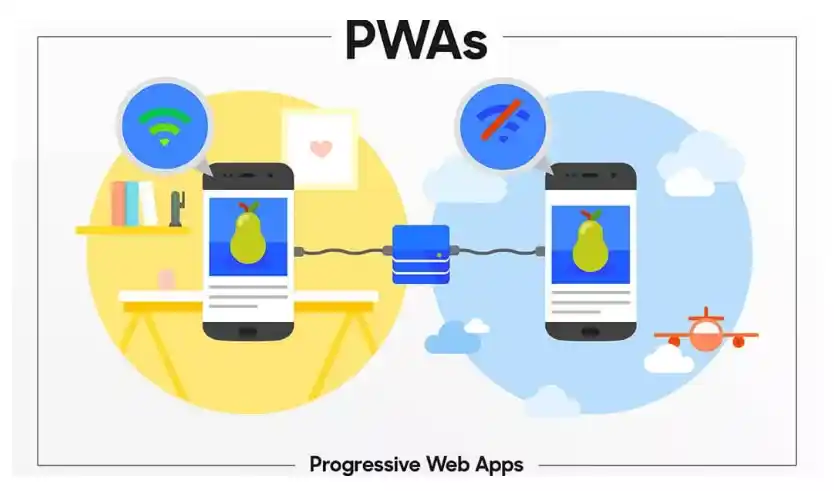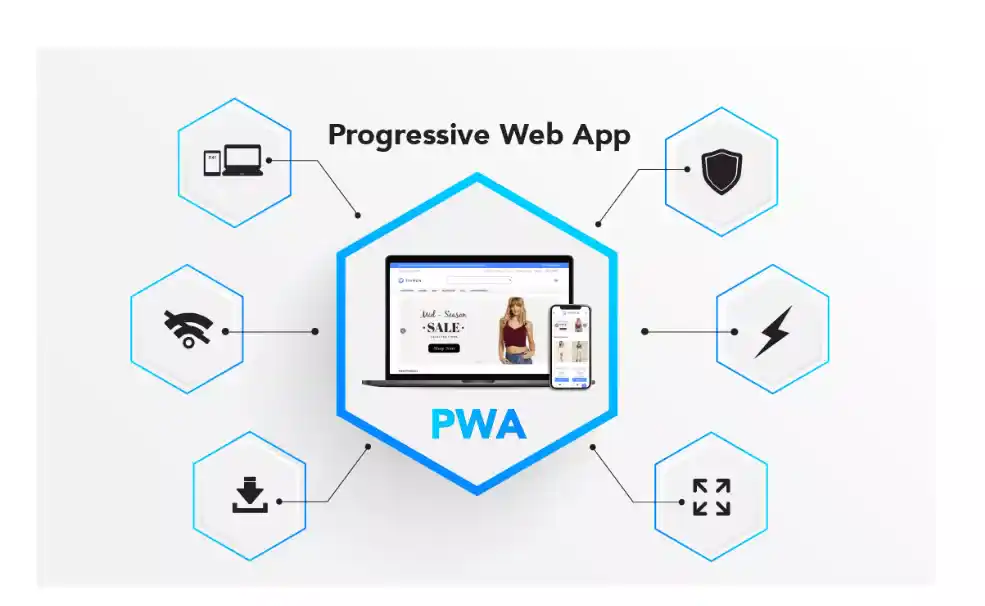Table of Contents
In today’s digital landscape, Progressive Web Applications (PWAs) are transforming how businesses interact with their users online. By seamlessly blending the best attributes of mobile apps with the broad accessibility of web pages, PWAs offer a revolutionary approach to user engagement and performance.
This comprehensive guide delves into the nine key benefits of PWAs, illustrating not only how they enhance user experience but also their significant impact on business efficiency and success. From their offline capabilities to their cost-effective nature, discover how PWAs are setting a new standard in web development and why they might be the ideal solution for your digital strategy.
What is a PWA?
A Progressive Web App, or PWA, is a type of application that combines the best aspects of web and mobile technologies. It offers an app-like experience directly from a web browser, bypassing the need for users to download anything from an app store.
PWAs are highly effective because they deliver the rich functionality of native mobile apps along with the adaptability and economic advantages of web applications. This dual approach ensures a seamless and engaging user experience across various platforms.

Benefits of PWAs
1. Offline Functionality
- Progressive Web Applications stand out because they operate independently of network conditions.
- This means that PWAs can function offline, utilizing Service Workers and APIs to cache and retrieve page data.
- This capability ensures that users can access previously loaded content without an internet connection, enhancing usability in areas with poor connectivity.
2. Optimized for Search Engines
- PWAs are designed to be highly discoverable, adhering to web standards that boost their visibility in search engine results.
- Features like HTTPS support and a web app manifest are prerequisites for a website to qualify as a PWA, not only improving security but also enhancing search engine optimization (SEO).
- These technical enhancements facilitate the indexing of web content and support features like adding the site to a mobile home screen for quick access.
3. Installable on Devices
- One of the key benefits of PWAs is their ability to be installed directly onto a device, similar to native apps.
- This feature allows users to open the app with a tap on the home screen icon, bypassing the need to launch a browser and enter a URL.
- While installation is not mandatory for functionality, it provides a more app-like experience and can significantly boost user engagement and re-engagement without the hurdles of app store approvals.
4. Easily Linkable
- Unlike native apps, which require specific UI considerations and strategic in-app prompts to direct user actions, PWAs are accessible through direct URLs.
- This linkability makes it easier to guide users to specific pages or content, enhancing the ability to engage users directly and efficiently.
- The straightforward URL structure for the benefits of PWAs not only simplifies sharing but also integrates seamlessly with other web-based tools and platforms.

5. Responsive Design Enhances User Experience
- In 2023, more than half of all internet traffic originates from mobile devices.
- This shift requires brands to offer a seamless, omnichannel experience that adapts to user interactions across desktop, mobile, and physical stores. Responsive design is crucial in meeting these evolving user expectations.
- Progressive Web Applications (PWAs) excel in utilizing modern technologies to create a web application UI that is not only flexible but also automatically adjusts to fit the layout and preferences of different devices. This responsiveness is one of the critical benefits of PWAs, ensuring users enjoy a consistent and engaging experience no matter how they access the web.
6. Built-in Security Features
- One of the significant benefits of PWAs is their enhanced security.
- PWAs are inherently secure, built using HTTPS to encrypt all data transmitted between the app and the server, thwarting unauthorized access.
- Furthermore, they employ Service Workers to handle app functionality offline and use a manifest to manage app launching and display options. With generally fewer permissions than native apps, the benefits of PWAs reduce the risk of security threats, making them a safer choice for businesses and users alike.
7. Cost-Effectiveness in Development
- Developing PWAs involves using standard web technologies like HTML, CSS, and JavaScript. This approach is more cost-effective compared to creating native applications for multiple operating systems such as iOS and Android, which require more time, and resources, and incur app store maintenance fees.
- The affordability for benefits of PWAs make them an attractive option for businesses looking to optimize development costs while reaching a broader audience.
8. Superior Performance Over Standard Web Apps
- PWAs are designed to be lightweight, which translates into faster load times, smoother animations, and enhanced responsiveness compared to traditional web apps. This performance advantage contributes to a more pleasant and adaptable user experience across various devices.
- Additionally, PWAs utilize progressive enhancement strategies to ensure compatibility across different browsers and devices, further highlighting their superiority over both standard web apps and native mobile apps.

9. Enhanced User Engagement Opportunities
- Push notifications are pivotal in maintaining user engagement, a feature traditionally reserved for native apps. PWAs bridge this gap by leveraging web push notifications, which re-engage users even after they have left the website.
- This capability allows businesses to maintain a consistent and engaging presence on both desktop and mobile platforms, enhancing user experience and potentially increasing the lifetime value (LTV) of users.
Conclusion
The benefits of PWAs are transforming the digital experience. By offering responsive design, built-in security, cost efficiency, superior performance, and enhanced engagement opportunities, PWAs present a compelling alternative to traditional web and native mobile apps.
As technology advances and user expectations evolve, embracing PWAs can provide businesses with a competitive edge, ensuring a seamless, secure, and engaging online presence for all users.





